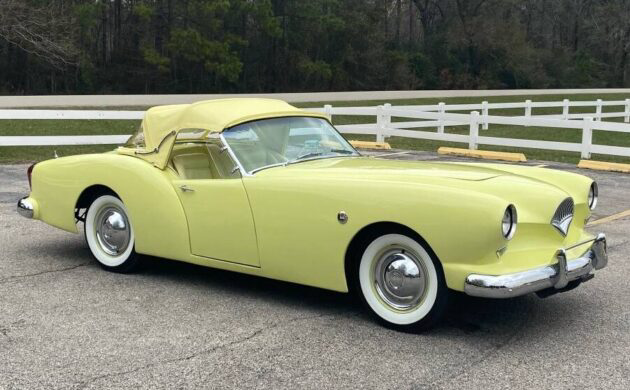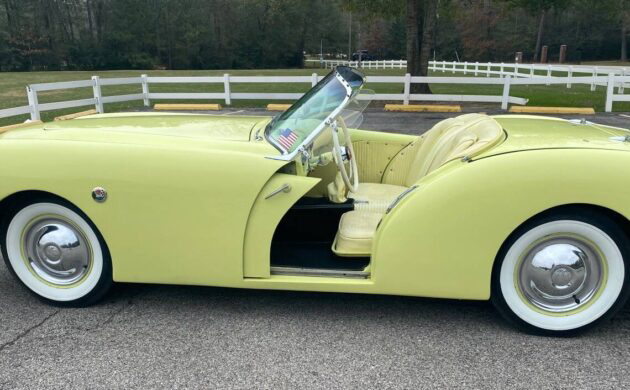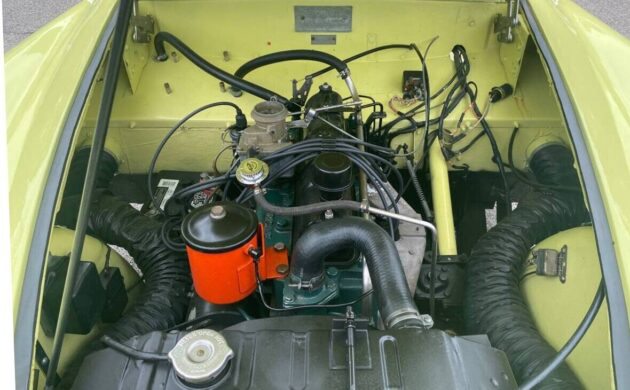One Year Only: 1954 Kaiser Darrin Convertible
The fifties were a fun and innovative time period in the course of automotive history, with one of the many reasons including it being the decade when the fiberglass-bodied car we all know and many of us love was introduced. But a lesser-known U.S. builder also came out with a sports car around the same time that utilized the same body material, although it was a very short-lived endeavor. That car is the Kaiser Darrin, billed as a 1954 model with a total of only 435 production examples manufactured during its brief run, so they’re in short supply and don’t often turn up for sale. If the idea of owning a rare and unusual 50s two-seater that’s bound to turn heads and raise questions everywhere you go turns you on, this 1954 Kaiser Darrin here on Craigslist would probably tick all those boxes and more. It’s in Magnolia, Texas, and you’re going to need nearly a hundred grand stashed away before summoning the seller.
Barn Finds reader T.J. has sent us lots of great tips recently, and we’d like to thank him for this one and all the others! If I had to pick a favorite feature about the body, it would probably be the doors, which instead of opening out slide into the front fenders on a track. I’m surprised this design didn’t catch on, as it appears like an efficient way to both enter and exit a vehicle, and is kind of one of those cases when form and function seem to blend together nicely.
We don’t really get much in the way of the car’s past or how long the seller has owned it, but he does claim the Darrin is in excellent condition with the paint described as the same, although he does add that there are some slight flaws in the finish. This seems like a more than reasonable assessment, as I’m having trouble finding much to fault regarding the body or paint job, plus the top is looking pretty good too. Another cool feature is the convertible being able to be utilized in three positions, including up, down, or in a Targa stance.
I was sort of expecting the hood to be hinged from the front, but that’s not the case, and I was pleased to see how well things present in the engine compartment. Everything appears to be in good order in the bay area, with the seller stating that the motor has good compression and runs well, plus there’s also been some recent maintenance including new spark plugs, wires, points, cap, rotor, and coil. Quite a bit of brake work has also been performed along with a fresh radiator flush, and additionally, both the carburetor and fuel pump have been rebuilt.
Surprisingly, the owner doesn’t specifically mention anything at all about the interior, but everything inside that’s visible either looks like it’s well-preserved or has been redone to a high-quality standard. I’m also liking how the painted areas inside match the exterior color, and overall this seems like a fine example of a Kaiser Darrin. I can envision way worse ways to spend $99,000, which is about the median sale value according to data from Concept Carz. What do you think?
Auctions Ending Soon
 2006 Ford Mustang Saleen S281 SCBid Now10 hours$15,000
2006 Ford Mustang Saleen S281 SCBid Now10 hours$15,000
 2002 Subaru Impreza WRXBid Now3 days$333
2002 Subaru Impreza WRXBid Now3 days$333
 1975 Chevrolet Corvette ConvertibleBid Now3 days$3,000
1975 Chevrolet Corvette ConvertibleBid Now3 days$3,000
 1964 Ford F-100 Camper CustomBid Now3 days$2,000
1964 Ford F-100 Camper CustomBid Now3 days$2,000
 2006 Jeep Wrangler SportBid Now5 days$10,500
2006 Jeep Wrangler SportBid Now5 days$10,500






Comments
Throughout automotive history, there have been several “swing and a miss”, this, however, was NOT one of them. Personal roadsters were a future hit. GIs returning from Europe, wanted a roadster back home, but was slim pickens. What, a Crosley? Several offerings popped up, but I thought the Kaiser was the nicest. Some say the doors were troublesome, and been debated for years, it should have come with the tossed around idea of a Cadillac V8. Only one was produced, I read. Again, they want $100grand, and no air cleaner? It won’t have good compression for long, but that’s my nit-pick, they were fantastic cars.
Howard, I’m going from memory here, and others can correct me. But IIRC, while the Darrin was being produced, and NOT sold…Kaiser-Frazer was in upheaval. Credit was cut off to the company. That is, Kaiser-Frazer, not the parent, Kaiser Industries. Cars were not selling, and that included the few Darrins that made it to the few showrooms left.
Henry Kaiser, sole ruler of his domain (after Joseph Frazer left in disgust) made some fast decisions. First, Willys-Overland was on the edge of bankruptcy. It would be a second time around for them – they were in bankruptcy prewar. Kaiser Industries, separate from Kaiser-Frazer, had the money to obtain them. And Henry Kaiser, builder of roads, the Hoover Dam, and Liberty ships, knew how to make money off government contracts, which by this time were the core of Willys’ business…military jeeps.
Willys-Overland was purchased; it was merged into the remnants of K-F, and the whole outfit renamed Willys Motors. Kaiser automobiles, Willys civilian automobiles, and the lease on the K-F plant at Willow Run, were all cancelled.
There was a long stopped assembly line of Darrins…apparently assembly of the roadster was semi-hand-built. They sat there, as tooling on other lines was taken down and moved to Argentina – another Kaiser startup, IKA. There, the Kaiser cars were to be assembled for another eight years, and IKA to later make Ramblers under license.
What to do with the incompleted Darrins? General Motors wanted Willow Run, after a fire in the Hydramatic plant. This was a golden opportunity for Kaiser to get out from under it. Reportedly, Howard Darrin bought (as I recall) a number of Darrins with no engines, shipped them to his California shops, and stuffed Cadillac V-8s into them.
Good to see this old memory. Owner says in a comment that they have the air cleaner.
This amount of style, coolness, and ostentatious flair will never be repeated again….what a generation!
👍🇺🇸
I remember this car… I was about 12 or so, and I loved it. The 53 Vette was just different enough to turn a lot of heads, then the 54 was a slight moderation and then this one really turned heads back then. A fellow who lived in Eastborough Kansas drove one like this to his work at the Wichita Beacon main office. The bus driver (on the bus I was on) stopped the bus, got out and looked it over…so several of us passengers did the same, and we all liked it !!
They don’t make bus drivers like that anymore!
A hideous looking car. Hideous.
The front end looks like it was sucking on a Lemon !
Students of automotive design would immediately know that Darrin was the designer because the grille is his artistic image of the heart
The tracked doors recessing into the fenders are a unique feature. It may seem an efficient way to both enter and exit a vehicle but there are design issues. One is when ‘open’ a door reduces the width of an already limited entry by several inches. More importantly is the lack of door glass. The limited size of the doors precludes the use of door glass. Even if the frameless doors have frameless windows, the windows must be lowered for the doors to work as designed. When a door is closed from the outside how can its window be raised from outside the vehicle?
Although doors recessing into the fenders are not very practical, a similar feature is found on many of today’s vans. The difference is the door tracks place the open doors parallel to the body rather than within. Practically aside the design is very appealing.
The doors were very light, and one problem was, dirt would get into the tracks and lift the doors off the track, or bind the rollers. There of course was only one set of tracks, on the bottom.
It’s a slick idea. But in application, it just wasn’t worth the hassle.
Today you could overcome those obstacles with electronics. One press of your remote key fob could do all of that plus open and close the door for you.
The car is a roadster…no windows
“My plan is to put it on Bring a Trailer if it doesn’t sell from this ad.”
See you on BAT!
Here’s one car that truly cried out for a ohv V-8. That slick looking body, with a boat anchor under the hood.
There was none available. The SBC was still in development – a year away in release. Packard’s V-8 was a 600-pound monster.
Kaiser had an engineer, David Potter, running a crash V-8 program…but time was running out; and Potter, and his designs, were soon out of a job. Trudging down to the new company, American Motors, as it turned out…”developing” a new V-8 in less than a year.
But only Cadillac had a V-8 that was even remotely practical for this car; and Cadillac was not interested in deals with Kaiser-Frazer.
Studebaker had an OHV V-8 since 1951 – supposedly based on the Cadillac V-8 design. It might have been a good (but heavy) engine for this car.
The other part of the equation was, would that engine be for sale.
V-8s were the hot engine at that time, and there were no spares. American Motors, formed under George Mason, had plans to buy V-8s from Packard. Mason’s vision was to combine the new AMC with Studebaker-Packard, for a fourth large multi-line American company.
S-P didn’t want to sell Studebaker, or Packard, V-8s. Rather than refuse, they put a price on engines that was prohibitive.
This was to a potential merger partner that could have represented James Nance’s get-out-of-jail-free card. Already Packard was in trouble with Studebaker, seeing the doctored financial books. AMC, relatively well-off, could have been their escape…and they were putting the screws to them.
What would they do to Kaiser, the upstart that everyone hated? Today, we don’t know…perhaps a Kaiser emissary approached S-P. Many records are lost and many more casual feelers went unrecorded.
Ford had one. Remember?
Much like GM was not interested in talking to Donald Healy about his idea for them to supply engines for his Healy roadsters. He then went to Nash.Thus the name Nash Healy.
The Willys 161 F head engine was actually one of the most efficient engines in production. 90 hp, as compared to the Chevrolet 216 that also produced 90 hp. Not a boat anchor. The 161 is light weight also, so no power steering needed, as would be with your OHV V-8. Darrin’s steer easily with good handling due to this light weight engine. The best V-8 choice for this car might be the aluminum Buick 215, but it didn’t arrive until 1961.
Do you say the same for the early ‘vetts?
I would get a vanity plate that reads BOBBY
That took me a minute!
You are correct Scott, and Rosie (real name Rosen) was truly one of a kind gentleman. He spoke to each passenger who boarded (but since a lot of us were repeat riders, he would call most of us by name). I remember an occasion when traveling from Eastborough to Beechwood (truly wide open spaces for a couple of miles), a woman was stranded with her car not functioning, and he stopped to help (I was headed to Beechwood). He had her lock the car, she boarded the bus, rode to Beechwood, swung by the grocery store to call for help, he dropped off us passengers at our normal places (I stayed to help just in case), he went back to the grocery store to see if she called someone. She did call her husband who was on his way to the car, so she got back on the bus, and he took her back to the car. I got off as well to stay with her until her husband showed up. (I had a mile walk to get back, but the husband dropped me off before they headed back to the car to wait for the repair truck). Rosie wouldn’t accept any money for doing what he did, even though it was offered.
My Parents’ first two cars were Kaisers: Manhattan, and Dragon. Dad felt they were ahead of their time, especially in dashboard ergonomics. The Kaiser
Darrin was so far ahead of what giant GM was doing with the Vette. But the lack of V8s and having to buy their transmissions from GM was a big problem.
Coolest feature? Sliding doors!!!
The Kaiser Darrin always seemed to me to be the perfect target for a replicar. You could build an exact one to fit on a Henry J chassis or a modern custom boxed one featuring any sports car power train and running gear. And you could produce an exact body with superb grade fiberglass. This could be the next Avanti.
It “IS” built on a Henry J chassis
As everyone knows, in almost any post WW2 car, small pebbles mysteriously appear in the footwells of the car. Perhaps they simply want to travel. But some of those pebbles seem to get lost between the outside of the car and the cozy insulated footwells, landing on the door plate.
Now comes a selection of automotive designers who decide to create doors that slide into the front fender voids, using small rollers traveling in a single horizontal track. I must assume that these designers all kept very tidy cars, especially the interiors. Afterall, what designer would create a situation where a single renegade pebble would prevent the closing of the car door?
I think I know the reason for the design. Many years ago [early 1980s] I was doing a “driver type” restoration to a Kaiser Darrin [actual name: the Kaiser 161.]. I was in Toledo, Ohio buying some parts [for the Darrin and my 1954 Kaiser Manhattan sedan] from a former Kaiser employee who told me the reason for the sliding door was due to problems related to flexing of the firewall/cowl on the test car’s body. He said that with a pair of hinged doors on the prototype car, when both doors were opened, the entire cowl was flexing and the door latches were not matching up with the latch posts. Efforts to reinforce the cowl were not working well enough, and the decision was made to try the sliding doors, and that solved the problem of closing the doors.
I am making an assumption here, but I suspect they knew the sliding door was not a perfect remedy, but it was the best they could do considering the lack of time and money.
I make fiberglass55 chevys. Requires serious steel cowl reinforcement or it would fold . It dosen’t take much space but requires a lot of fabrication and labor is$$$!
Actually the same fibreglass company that was making the bodies for GM’s Corvette was the manufacturer of the 435 Kaiser Darrins.
It “IS” built on a Henry J chassis.
Glaspar made the hood,doors, and covert top acess panel.
I never knew they existed until about 10 years ago watching an episode of Gas Monkey Garage. I’ve been infatuated ever since.
These are cool and this one looks very clean, and as Howard said no air cleaner. They are a bit on the small side.
This is pretty Hideous it reminds me of the Steppenwolf penismobile. If you don’t no what that is look it up.
This is my car! I’m waiting on BAT now but also trying to sell
Locally till BAT is ready. To the person that commented about the air cleaner, I have the original one, just forgot to put it on for the video. Any other question of if someone would like to come take a look, let me know!
I take care of one of these in a collection. Access to the interior is poor at best— the wheel well arch protrudes into and really obstructs your ability to enter or exit. Cannot imagine a properly dressed woman in a skirt trying to get in or out! With the top up, even worse. You dive in, head first, then try to pull your legs in. No air cleaner here, either.
This is the first one I have ever seen with the top up. Real landeau irons to help fold it, and, a 3 position top, which was common on British cars of the 1930’s, my 1939 MG SA had one. Top down, top up, or top halfway down, which in a bigger car, would leave the driver and front seat passenger outside, and the guy being chauffered, or the woman with special hair or hat, under cover from the wind in the back seat . It really had no purpose here, other than showing it could be done.
For those who find the Darrin ugly, most everyone else loves the styling. I can attest that at any car show, people swarm around the Darrin and love it, and especially females.
I’m reading a lot of “sour grapes” in the comments…
Btw, for the 4th time, there is a aircleaner!
LOL!